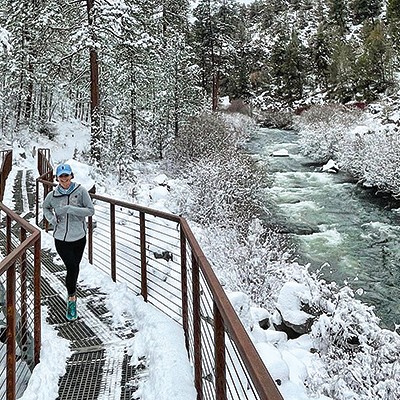On Sunday, Bend's Chris Horner, 41, won the Vuelta a España, a three-week-long bike race through the mountains and valleys of Spain. In doing so, he became not only the oldest rider to win the Vuelta (local papers there dubbed him El Abuelo, or the grandfather), but also the oldest rider to win a grand tour.
There are three such grand tours—Tour de France, Giro d'Italia and Vuelta a Espana—and to win any or all a racer must be not only superman fit, but intensely focused day in and day out (and also enjoy a spot of good luck). At nearly 42 years of age, Horner proved that on the steepest and most decisive mountain stages, he could ride with, and ultimately away from, the world's best climbers—some of who are roughly half his age.
His impressive victory is not only a personal coup—as of the last month Horner still had not secured a contract for the 2014 season—it is an encouraging shiny gold medal for so many others. It's a victory for Bend's robust cycling community; it's a victory for those who think their best years are behind them; and it's a victory for the sport—both in the U.S. and abroad, one that has needed a champion it can believe in.
That's why this week, we're awarding Horner a clipless pedal-compatible Glass Slipper.
Horner's exciting Vuelta performance—one that saw him win the leader's jersey early on, only to later lose it and then reclaim it again in dramatic fashion during the race's final days—is even more incredible considering he'd been sidelined with a knee injury for most of the season. (Horner had to sit out of the Tour of California, which he won in 2011 and missed the Tour de France, his biggest objective each year.)
Horner, ever the smiling gentleman, put such doubts to rest on stage five, where he won the 113-mile stage. After months away from the pro peloton, Horner reappeared, skinny and strong, to finish second overall. In retrospect, this should have been no surprise.
Horner is known to be a calculated racer and never wastes a precious match of energy unless he feels it's necessary. This spring, he proved he was still in good form, despite his advanced years. In early March Horner finished sixth at Tirreno-Adriatico, a hilly seven-day race across Northern Italy where he did battle with some of world's best climbers. And when we interviewed Horner before the Cascade Gran Fondo, an annual group ride he hosts, his enthusiasm for the sport was unmistakable. When we talked he specifically targeted the Vuelta, with its brutally steep climbs, as a race where he could do well, despite his midsummer injury.
In a sport thats has had a shadow a decade long cast over it by doping infractions, some have questioned Horner's impressive victory. It's too bad, but it's the world we live in. Horner and his team director have sworn up and down that the Bend racer is clean. Horner has never been sanctioned for a positive result and, given the sweeping investigations of recent years—including a bust that stripped Lance Armstrong, Horner's former teammate, of his seven Tour de France titles—we can only hope that the reason Horner has never been officially named and suspended is that he is clean.
Optimists say the sport is now changed for the better. As evidence, pundits point to races, like this year's Vuelta, that are won by seconds rather than multiple minutes. Attacks seem shorter and less explosive and riders' average race times are dropping, not getting faster—a fact that suggests riders today are cleaner than those of the past decade.
At the end of the day, it's Horner's exuberant attitude and love of the bike that shines through. These are traits that Bend's many bike riders, often too wrapped up in their own race results, could learn from. Bravo, Horner, for showing us all—young and old—how it's done. And bravo, cycling, for providing us spectators with another gripping grand tour.



























